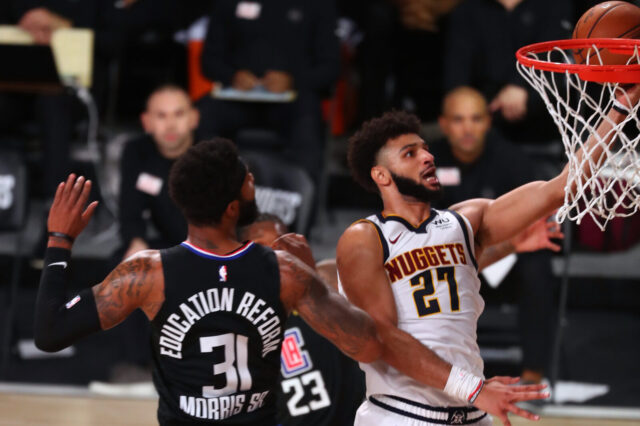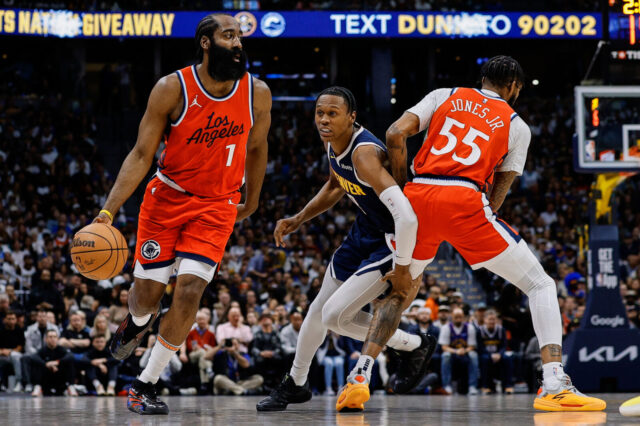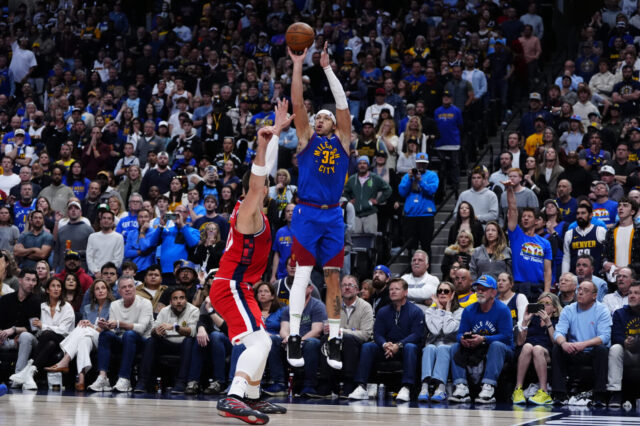Without Carl Scheer, there would be no Denver Stiffs.
Without Carl Scheer, there would be no Denver Nuggets either.
Literally.
Born in the home of basketball, Springfield, Massachusetts (you can’t make this stuff up) Scheer began his career in pro sports as an agent and then worked for the NBA under commissioner Walter Kennedy in the league office before being recruited to run the ABA’s Carolina Cougars in 1970. After a brief stint at the helm of the Cougars, Scheer was recruited by the then-ABA Denver Rockets in 1974 to save professional basketball in Denver.
And save it he did.
Upon arrival in Denver in 1974, Scheer used a fan contest to rename the team “Nuggets” – an homage to the 1949-50 Nuggets who were short-lived in the NBA – and brought along a fiery head coach named Larry Brown and a disheveled assistant coach named Doug Moe to rebuild a moribund Denver franchise. In one year under Scheer’s stewardship, the 37-win Nuggets became a 65-win juggernaut, led the ABA in attendance thanks to an assortment of creative marketing and promotions, and appeared in the 1976 ABA Finals where they lost to “Dr. J” Julius Erving’s New York Nets in six games.
Scheer's creativity was on full display during the 1976 ABA All-Star Game when the Nuggets players faced off against the ABA All-Stars (showcasing the likes of Erving, "The Iceman" George Gervin, Artis Gilmore and James Silas) and the game's halftime featured pro basketball's first-ever Slam Dunk Contest:
The 1976 Slam Dunk Contest (via TheNBAHistory)
Oh, and the Nuggets won the game 144-138 in a typical ABA overtime shootout with Nuggets superstar David Thompson claiming MVP honors.
But more importantly, Scheer’s Nuggets proved that they belonged in the NBA. So when the NBA agreed to absorb four ABA teams in 1976, Scheer’s Nuggets joined the Indiana Pacers, San Antonio Spurs and New Jersey Nets in the “big brother league”. It was thus fitting that Scheer was honored this past Saturday night as the Nuggets hosted their ABA rival Pacers (although I thought both teams should have donned their old ABA uniforms, but you can’t win them all).
When the Nuggets and their ABA brethren joined the NBA in 1976, the move was met with great skepticism. But the Nuggets made it known instantly that they belonged in the NBA. Appearing in three consecutive post-seasons upon arrival, the Nuggets lost to the eventual champion Portland Trail Blazers in the 1977 semifinals and lost to the NBA Finals runner-up Seattle Supersonics in the 1978 Western Conference Finals. The honeymoon would end briefly during the 1978-79 season (a season with eerie similarities to the one we’re witnessing right now in the Mile High City) as Brown abruptly departed after 53 games – a pattern that would continue throughout Brown’s bizarre coaching career – and Thompson succumbed to years of drug abuse. But after a two-year playoff hiatus, Scheer handed the coaching controls over to Moe and thus began the Nuggets’ second Golden Era as Moe’s Nuggets appeared in the playoffs for nine consecutive seasons from 1981 to 1990 with the most beloved Nuggets rosters of all-time thanks to star players like Alex English, Fat Lever, Dan Issel, Calvin Natt and Kiki Vandeweghe.
Capitalizing on Moe’s run-and-gun style that took advantage of Denver’s altitude advantage, in the early 1980s Scheer had the Nuggets’ logo redesigned to feature the now famous rainbow skyline, giving pro basketball in Denver an everlasting brand image that remains popular with NBA fans in Denver and beyond. And before leaving the Nuggets in 1984 to run the Los Angeles Clippers for a few seasons, Scheer was instrumental in making the Slam Dunk Contest a staple of NBA All-Star Weekend when the contest was resuscitated right here in Denver during the 1984 All-Star Game:
NBA SLAM DUNK CONTEST HISTORY 1984/1988 (via tijucanofarofeiro)
After running the Clippers for a few seasons, Scheer returned to Charlotte in 1987 to help kick off the newly franchised Hornets where he remained for three season. Following a second tenure in Denver in the early 1990s (a period during which I got to meet Scheer and form a lifelong friendship), Scheer moved back to Charlotte to form Scheer Sports and has been working with the Bobcats in marketing and sales since they were established in the mid-00s. After Scheer left Denver in the early 1990s, he and I kept in touch and he played a huge part in guiding my career path in sports entertainment, first interning at Turner Sports before I launched a nationally syndicated sports-themed comic strip and worked on projects for Fox Sports years later. Whenever I needed some advice or wisdom, Carl Scheer was just a phone call away, and Scheer’s guidance has always been invaluable in my professional career.
On Saturday night, the Nuggets honored Scheer as the man who saved pro basketball in Denver with a terrific video tribute before tipoff followed by an award presented at half court by current Nuggets owner Josh Kroenke. Kroenke and longtime Nuggets executive Lisa Johnson (who worked for the team when Scheer was in charge) deserve major kudos for putting this together and Scheer was received by the Pepsi Center faithful with a standing ovation.
I was able to catch up with my longtime friend before halftime and catch up about the good old days. And then at halftime we were joined by other members of the Denver sports media, including legendary sports media personalities Sandy Clough, Al Albert and Dave Krieger, and Nuggets.com reporter Aaron Lopez.
Here are some highlights from the halftime media gathering:
Why pro basketball in Denver in the 1970s?
CS: "In reality, I've always been tenacious in what I've done and I've always believed that Denver is a great city and it was important that they had another major league team to determine and show that [Denver] is a first class sports town."
Revisiting the creation of the slam dunk contest in 1976.
CS: "The NBA was still the major league. We were considered minor league but we knew we had the players and the All-Star Game in 1976 proved to a lot of people that we had special talents in the ABA. And since we couldn't do something substantial on a major league level, we had to do something dramatic. And that's how the slam dunk [contest] was born, to show the NBA and the rest of the basketball world that we had great players, athletic players. The NBA was still playing below the rim and they were struggling, but they were major league and still controlled the big cities and the television markets. So we did what we had to do to and those who were around in 1976 may have seen the single best day together of sports and entertainment."
What are you most proud of?
CS: "The day that the NBA said for all the players and $3.2 million you can become major league. It was the greatest day for basketball here in Denver."
How important is it to engage the past for current fans (this was my question!)?
CS: “Very important. I remember when Ted Williams and [Joe] DiMaggio went on tours 50 years after the 1941 [World Series] and came back to be honored by the baseball community. Every stadium was sold out that summer and made me believe again that you need to stay with your past if it’s rich enough. Football, baseball and basketball have a rich history. And in order to sustain success you have to recognize your past.”
How many limited partners did the Nuggets have when you ran the team?
CS: "32 guys. [The investment was] $30,000-$32,000 [apiece] around there. When we had a chance to buy it, keep it going, I think we were $4 million in debt and Red McCombs begrudgingly bought it. And then he kept it for two years and sold it to Sidney [Shlenker] for $16 million and everyone thought [Sidney] absolutely stole it. But had Red not come along, the team would have folded. Times were different then. We had no idea how good times were going to be even though David [Stern] told us it would be, we didn't have the resources to wait around. But we kept it alive and it was a great product. As general partner, I had the most risk if we didn't succeed. I thought we'd survive in Denver, but I had no idea that we'd see the explosion of growth that this sport has had. David [Stern] was a magician in the short term and a visionary in the long term and he's going to go down in history as one of the greatest commissioners of all time."
Do you consider yourself a visionary?
CS: "I think sometimes I do, yes. When I succeed. When I fail … like when I traded Bobby Jones … I wasn't a visionary."
The forever humble, forever gracious Carl Scheer. Everyone in Nuggets Nation should be eternally grateful for Scheer's longtime stewardship and love for this amazing franchise.



